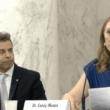The shocking but unsurprising decision to leave Paris
June 6, 2017
President Trump’s announcement in the Rose Garden that the United States would leave the Paris Agreement was shocking, but on another level unsurprising. The decision had long been foreshadowed by many advance indicators. These include Trump’s repeated disparagements of the threat of man-made climate change, encapsulated in statements such as: “The concept of global warming was created by and for the Chinese in order to make US manufacturing non-competitive.” Then, too, Trump has filled senior positions in his administration with people— Environmental Protection Agency Administrator Scott Pruitt probably has the highest profile, but is hardly alone—who do not accept the basic findings of mainstream climate change science. A further advance indicator: Almost the entire elected leadership of the Republican Party also does not accept the basic findings of mainstream climate science. That leadership has been unanimous in endorsing Trump’s decision to leave the Paris Agreement.
The findings of mainstream climate science are based on well-supported research results and express our fundamental understanding of the climate change observed in recent decades. In brief, we climate scientists have shown convincingly that climate change is unequivocally happening here and now, that its consequences are real and serious, that it is overwhelmingly caused by human activities, and that it poses significant risk for a large range of human and natural systems. For many years, there has been a strong and well-documented scientific consensus endorsing these findings, expressed in statements by leading scientific societies and national academies of science worldwide. Do a few qualified scientists disagree with the consensus? Yes, of course, just as a few scientists still deny that HIV causes AIDS, and a few still claim that vaccines cause autism. Science never produces unanimity or certainty, but it does ultimately converge on truth.
The rejection of climate science for purely political reasons—as evidenced by Trump and the rest of the Republican national leadership—is, actually, very much a recent development. When John McCain ran against Barack Obama in 2008, both candidates were deeply concerned about man-made climate change. Since then, the American political environment has undergone fundamental change, including, notably, the Supreme Court’s decision in Citizens United, which found that prohibition of independent political expenditures by corporations and unions violated the First Amendment protection of free speech. Also, in recent years, aspiring Republican politicians have been subjected to a litmus test that requires them to reject mainstream climate science as a requirement for obtaining funding from fossil fuel-related sources, including the oil billionaires Charles D. and David H. Koch.
The impact of this litmus test and a flood of corporate money into the political arena has been dramatic. While there are no prominent examples of Republican candidates condemned by their party for rejecting climate science, several Republican candidates have paid a heavy price for suggesting that we climate scientists might be right. One of the most dramatic cases involves Bob Inglis, a six-term conservative Republican congressman in a very conservative South Carolina district. In 2010, after endorsing mainstream climate science, Inglis suffered a landslide defeat in the Republican primary. His opponent, with Tea Party support, condemned Inglis for endorsing climate science. Other Republican politicians quickly took notice; soon, we no longer heard them agreeing with us climate scientists.
When I suggested that Trump’s announcement was shocking but not surprising, the shock was this: In proclaiming emphatically that he would lead the United States out of history’s most important agreement on climate change, Trump never mentioned climate change or climate science. You can search the text of Trump’s June 1 announcement, and you won’t find a single mention of the terms “climate change” or “global warming.” None. Zero.
The Paris Agreement was designed to help solve a real problem: climate change. There is not the slightest hint in Trump’s announcement that human-caused climate change is a serious threat, or that it will cause great economic damage unless vigorous action is taken. If we are not allowed to acknowledge that there is a problem, or to discuss what scientists have learned about it, then we cannot possibly solve it.
Meanwhile, efforts by the press to learn whether Trump himself “believes in” climate change have been largely unsuccessful. On this topic, as is often the case with Trump, conflicting statements from him are easy to find. Furthermore, to “believe in” climate change is to relegate what should be a scientific topic to the category of faith. Deciding what to think about the reality of climate change should be a matter of assessing facts and evidence, not a matter of belief. Science is a way of testing whether what we think about a phenomenon conforms to the laws of nature or not.
“I was elected to represent the citizens of Pittsburgh, not Paris,” President Trump said. Of course, the Paris Agreement, or Accord de Paris in French, has nothing to do with the citizens of Paris or any other city. The label reflects the fact that this agreement was negotiated by nearly all the countries of the world, in a lengthy process culminating in a two-week series of meetings held in Paris in late 2015. For political effect, Trump confused the venue with the subject of the agreement. But that’s hardly the only error or misrepresentation in Trump’s announcement.
It ignored the important facts that the Paris agreement imposes no penalties and no restrictions, is non-binding, and is based entirely on voluntary commitments by individual nations. Trump was simply wrong when he stated, “China will be allowed to build hundreds of additional coal plants. So, we can’t build the plants, but they can, according to this agreement. India will be allowed to double its coal production by 2020. Think of it. India can double their coal production. We’re supposed to get rid of ours.” There is nothing in the Paris agreement that allows or encourages China or India to build coal-fired power plants or prohibits the US from doing so.
Many published analyses and detailed fact-checks of Trump’s announcement have shown that it is rife with such falsehoods, half-truths, and misrepresentations. Leaving the Paris agreement will not bring coal jobs back to the United States. Trump’s talk of renegotiating the Paris agreement is not grounded in reality—as many other countries have already made clear. Trump’s estimates of economic damage the Paris agreement will inflict on the United States are error-ridden and unpersuasive. And then there is the truly shocking elephant in the room, the failure on the part of Trump to even acknowledge the existential threat that climate change poses.
The process of a country formally leaving the Paris agreement is lengthy. It will take until the 2020 Presidential election to complete. But the Trump administration can immediately stop participating actively in the Paris agreement. There is no penalty for doing that, other than subjecting the United States to widespread censure and condemnation, which has already begun.
The Trump administration may well intend to continue to remain silent about climate change. That would be consistent with Trump’s announcement failing to mention the subject. It is also consistent with the practice of deleting climate change information from the websites of federal agencies and departments, which has already begun.
Given the administration’s silence, it seems clear what is most needed now. The rest of us should continue to talk forcefully about climate change, to work to address the challenge it poses, to build on the great progress already achieved, and to stay optimistic—all to keep the subject of climate change highly visible in the press and before the public, and thereby defeat President Trump’s truly shocking attempt to have the United States of America simply ignore the existential threat of climate change.
Richard C.J. Somerville
distinguished professor emeritus and research professor, Scripps Institution of Oceanography, University of California San Diego
EXPERT COMMENTARY
member, Bulletin Science and Security Board













